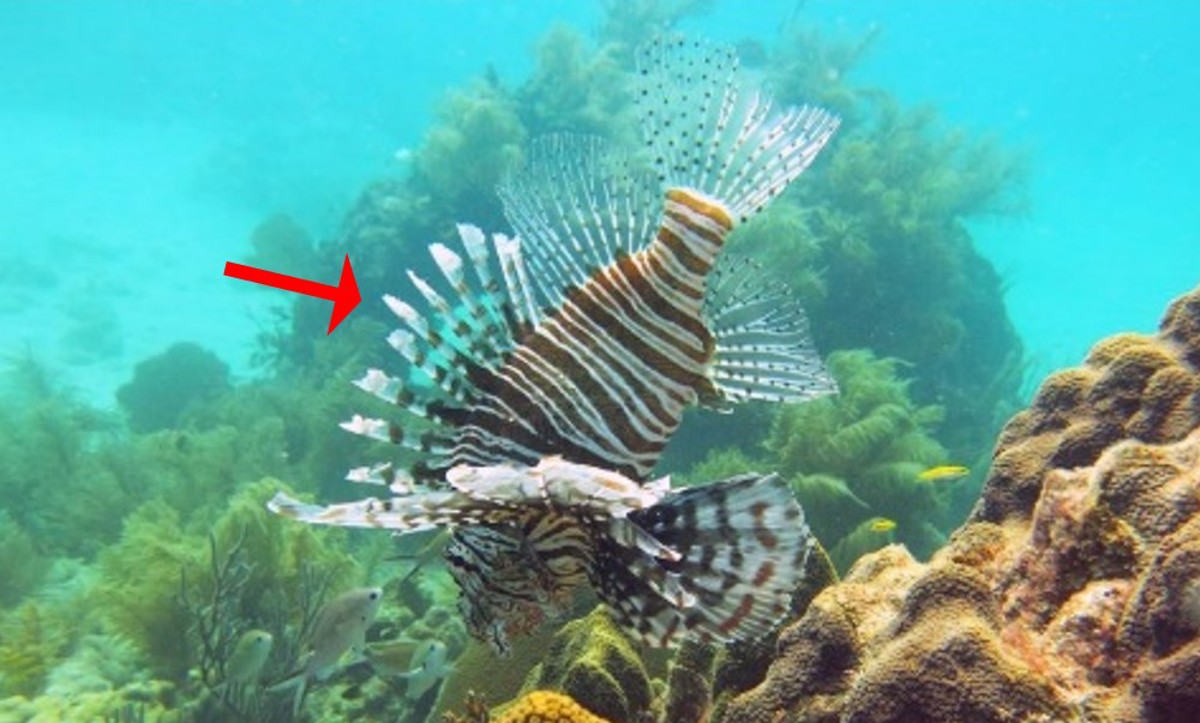Diver finger injury from Lionfish fin ray
- Safety Flash
- Published on 19 November 2021
- Generated on 14 July 2025
- IMCA SF 31/21
- 2 minute read
Jump to:
A diver suffered a finger injury from a Lionfish fin ray.
What happened?
The incident occurred during diving operations, when the diver went to pick up some tooling and the Lionfish came close to the diver.
The diver tried to push the fish away, and in doing so his right thumb was pricked by one of the fin rays of the fish.
The diver was recovered to the bell; on closer inspection there was a slight bleeding and small piece of the fin ray lodged in thumb.
The bell was recovered to surface, where the medic assessed the injury and treated with a wash, dressing and pain killer.

A Lionfish (Fin Ray highlighted)
What were the causes?
Our Member noted immediate, underlying, and root causes:
- Immediate cause – contact with sharp object (diver's right thumb punctured through glove by one of the fish spines).
- Underlying causes:
- Behaviour – Poor decision-making / judgement (diver tried to wave / push fish away).
- Behaviour – Lapse / mistake / omission (divers had been advised to keep clear of hazardous marine life and not attempt to move or engage them in any way).
- Behaviour – Poor decision-making / judgement (diver tried to wave / push fish away).
- Root cause – lack of due care in response to known hazard in that region.
Actions
- Review of gloves worn by divers to ensure suitability for protection against venomous fish in that region.
- Refresher training with dive team on venomous fish hazard and update of risk assessment.
- Additional controls implemented for remainder of project:
- Every dive team briefing included risk of venomous fish.
- Dive Supervisor monitor video feed and warn of any Lionfish in vicinity.
- Divers increased buddy watching in water to warn of fish in vicinity.
- Every dive team briefing included risk of venomous fish.
Related Safety Flashes
-
IMCA SF 20/21
22 July 2021
-
IMCA SF 31/16
22 November 2016
-
IMCA SF 16/13
17 October 2013
-
IMCA SF 07/10
10 November 2010
IMCA Safety Flashes summarise key safety matters and incidents, allowing lessons to be more easily learnt for the benefit of the entire offshore industry.
The effectiveness of the IMCA Safety Flash system depends on the industry sharing information and so avoiding repeat incidents. Incidents are classified according to IOGP's Life Saving Rules.
All information is anonymised or sanitised, as appropriate, and warnings for graphic content included where possible.
IMCA makes every effort to ensure both the accuracy and reliability of the information shared, but is not be liable for any guidance and/or recommendation and/or statement herein contained.
The information contained in this document does not fulfil or replace any individual's or Member's legal, regulatory or other duties or obligations in respect of their operations. Individuals and Members remain solely responsible for the safe, lawful and proper conduct of their operations.
Share your safety incidents with IMCA online. Sign-up to receive Safety Flashes straight to your email.